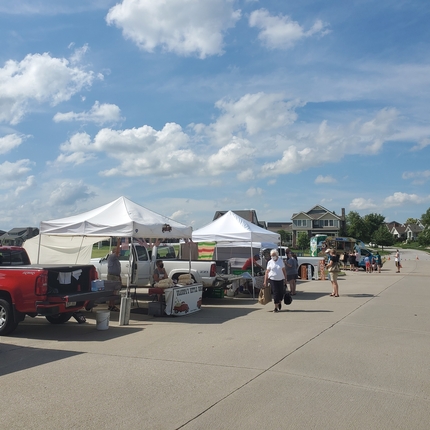Rural farmers markets play an important social and cultural role in addition to helping connect food providers and consumers. This spring, we’ve had the chance to talk one on one with dozens of market managers across the state of Nebraska. Our goal has been to gather insight that will help drive the content and format of upcoming trainings and a toolkit we are helping put together for rural market managers.
Together with our local partners, we’re modifying Northeast Iowa RC&D’s toolkit, which can be found at northeastiowarcd.org/toolkit/. While some of the information in these toolkits is state-specific, by and large the information provided is relevant regardless of what state you call home.
Around the country, most markets are either already open, or opening soon, and while they’ll look a little different this year, they continue to bring value to communities. Those initially wary of attending a farmers market during the pandemic can take comfort that open-air markets are no less safe than grocery stores, and managers are taking necessary precautions to bolster customer, food, and vendor safety.
Just as locally owned grocery stores in small towns need our support, there’s also great value in supporting our local farmers markets. Markets are a gathering place of people and products; they fuel our bodies with fresh food, and our sense of home and belonging.
This season, many vendors and markets are getting creative by having items pre-bundled and occasionally prepaid. Traffic flow, vendor placement, and product sampling are all more regulated this season. These temporary changes to guidelines can make the market more efficient for getting your groceries in the bag and back home safe, even if the social side of the market can’t be as robust for the time being.
Remember your small town farmers market this year. Let managers and vendors know you care about them, and you don’t want this year’s change in routine to throw them off course indefinitely. If you don’t feel safe getting out of the house to visit markets in person, check in with farmers to see if they’re doing curbside pickups or drop-offs. Even sending folks a quick note of support will go a long way in letting them know they matter to the community, for fresh food as well as rural vibrancy.
Farmers markets tips from managers and staff
Are you a part of your local farmers market, as a customer, vendor, manager, cheerleader, or funder? Markets carry great tradition, and whatever your current or future role is, here are some tips and experiences from managers and staff:
- Markets need to be dependable and well-advertised—day of week, time of market, and location should be established, well-known, and consistent.
- A core group of vendors is important; customers want to know what to expect, and vendors see more consistent sales if they stick to a steady schedule.
- There’s such a thing as too much product duplication—unique and value-added products are important for customer interest and demand, and for vendor revenue.
- Markets are often more successful when there are reasonable rules in place and enforced. Vendors and customers know what to expect, and any potential conflicts can be handled with respectful communication.
- Everyone should feel welcome at the market. Take steps to ensure race, religion, age, and income level don’t discourage anyone from participating.
- Programs such as Supplemental Nutrition Assistance Program (SNAP, formerly known as Food Stamps), Women, Infants, and Children (WIC), and the Seniors’ Farmer Market Nutrition Program (SFMNP) can play a crucial role in access to healthy local food, and can be taken advantage of at farmers markets. We’re looking forward to providing resources to help put these programs in greater use at markets.
- A great opportunity exists in rural areas sprinkled with small towns within close vicinity to one another. Market managers can collaborate (not compete) for the greater good. Think about forming a coalition made up of multiple small town markets in different regions of your state; schedule market times so they don’t overlap; hire one marketing coordinator for multiple markets to standardize messaging.
- Likewise, there may be innovative partnerships to consider that could help distribute the workload and make markets successful. We’ve seen markets partner with hospitals to provide nutrition information and demonstrations, and other markets invite the public library and local nonprofits to occupy a booth once a season.





